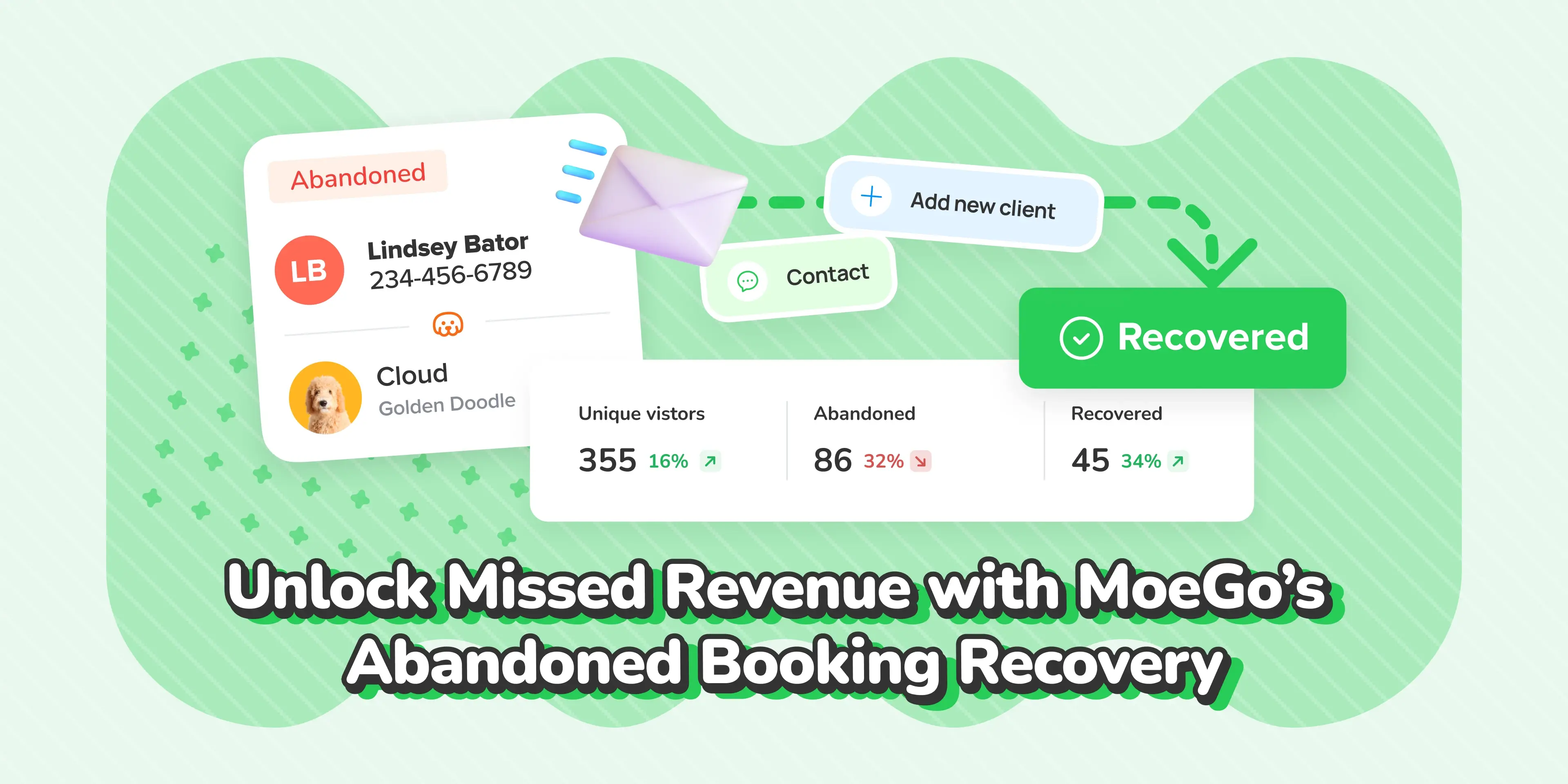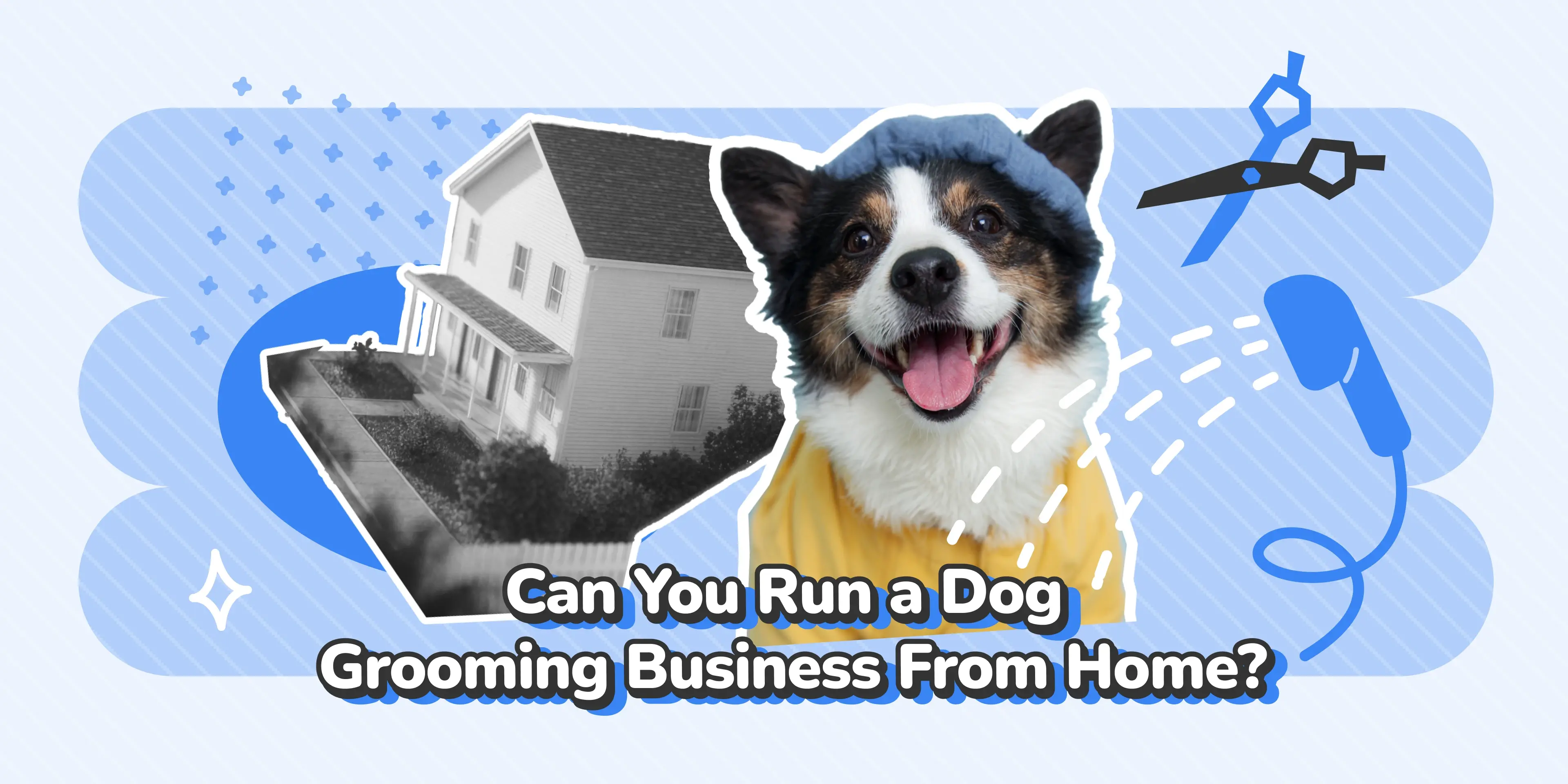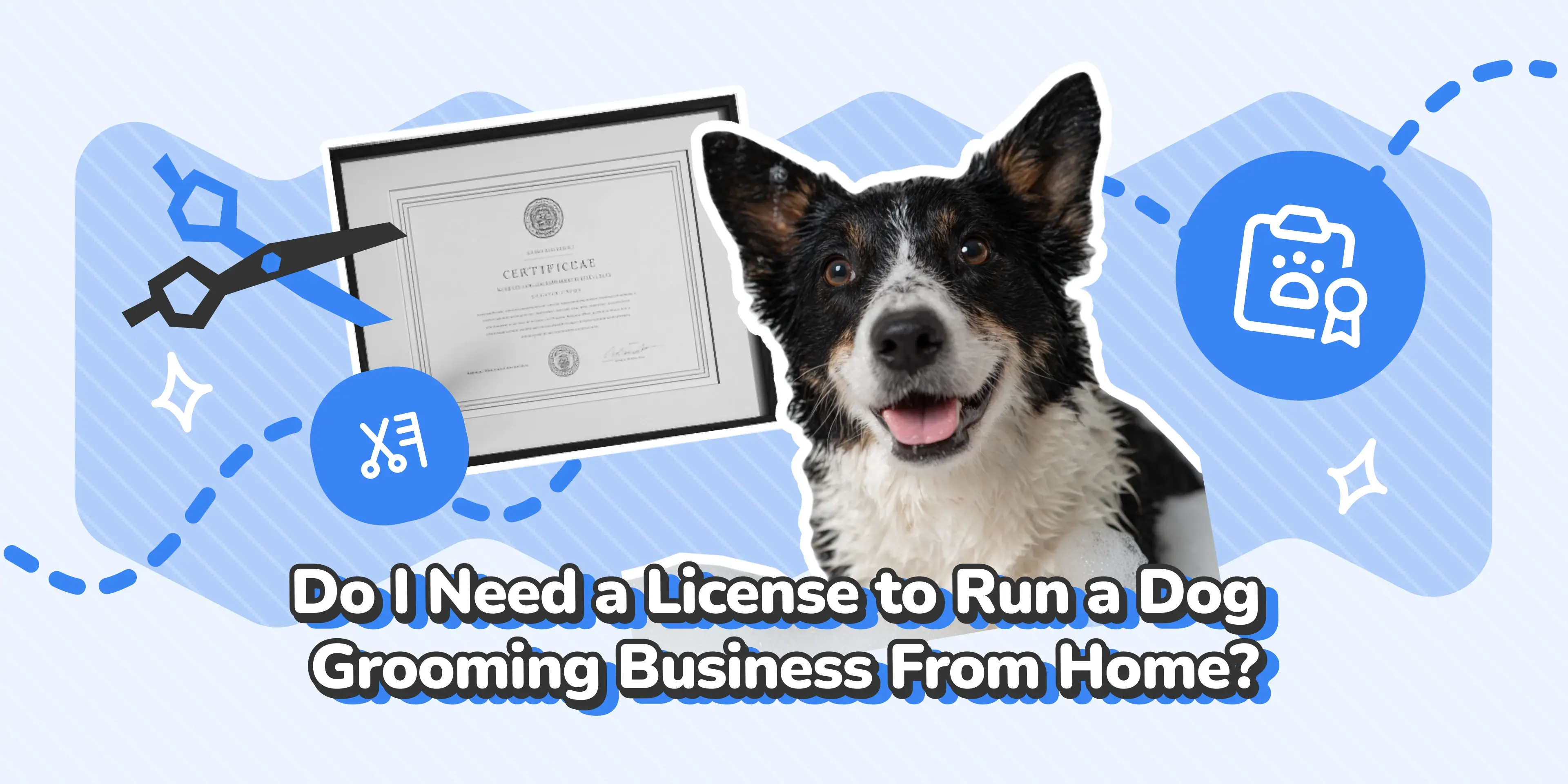Share this
Do I Need a License to Run a Dog Grooming Business From Home?
by MoeGo on Aug 19, 2025 3:28:13 PM
Do I need a license to run a dog grooming business from home?
It’s one of the first questions you should ask before buying a grooming tub, setting up your space, and booking your first client.
The answer in most places is yes, but the exact requirements depend on where you live.
Local governments often treat home-based grooming as a full commercial service, which means you may need a general business license, a home-occupation permit, zoning approval, and, in some cases, a dedicated pet grooming establishment permit.
On top of that, there are health and safety standards to meet and insurance coverage to arrange, since a standard homeowners policy won’t protect you in case of accidents or claims.
This guide focuses solely on licensing, permits, zoning laws, and insurance, with real-world examples to help you understand how the rules differ from one location to another, so you can start compliant and stay that way.
Why You Need a Business License to Groom Dogs From Home
Local governments license businesses for two reasons: compliance (zoning, safety, and consumer protection) and tax administration.
Whether you operate from a storefront or a spare room, most jurisdictions still expect you to register and hold a general business license.
The US Small Business Administration underscores that most small businesses need some combination of local and state licenses/permits, depending on the activity and location.
Many places treat home salons as home occupations.
The rule of thumb: you’ll likely need both (1) a general business license and (2) a home‑occupation permit that confirms your grooming activity fits residential zoning.
Cities like Chicago publish separate rules and a license category for home‑based businesses.
Skipping licensing isn’t a harmless shortcut. Operating without required approvals can trigger fines, forced closure, or denial of a future permit.
Compliance platforms and municipal guidance are clear that home‑based businesses are subject to the same licensing standards as brick‑and‑mortar operations, often including a home‑occupation permit.
Legal Requirements for Running a Dog Grooming Business From Home
Running a grooming business from home isn’t as simple as buying clippers and putting up a sign.
Before you take your first booking, you’ll need to meet the legal requirements that apply to small businesses, home occupations, and in some areas, pet service facilities.
These rules vary widely depending on your city, county, and state, but they all exist to ensure safety, accountability, and fair business practices.
Here’s what to check before opening your doors.
Business License and Registration
Even if you operate entirely from your own home, local governments still view dog grooming as a commercial activity, not a hobby.
In most cities and counties, that means you must obtain a general business license, often referred to as a business tax certificate, business registration, or similar.
Many municipalities have a dedicated home-occupation license process with specific forms, fees, and conditions on how you operate, while others include home-based businesses in their standard licensing procedure.
It’s also worth noting that licensing often extends beyond your city or county level.
If you sell retail items such as shampoos, brushes, or treats, most states require a separate sales tax permit, and in some cases, additional vendor registration.
On top of that, federal agencies may require certain registrations if you engage in interstate sales or shipping.
The US Small Business Administration and state revenue departments both emphasize that business owners need to meet all applicable local, state, and federal licensing requirements before beginning operations, regardless of where the business is physically located.
Zoning Laws and HOA Rules
Licensing answers the “who are you?” question. Zoning answers “where can you do it, and how?”
This is where rules diverge sharply:
- Allowed with conditions: Some cities explicitly allow dog grooming as a home occupation with limits on floor area used, customers per day, parking, and signage.
- Prohibited uses: Other municipalities ban pet grooming as a home occupation outright. Sacramento’s home‑occupation rules, for instance, state that pet services (including grooming) are not permitted at the residence. Hanford, CA, lists pet grooming among prohibited home occupations.
- Allowed in some counties, by permit: Orange County, VA’s handout includes pet grooming businesses among examples of home occupations, again, with standards to meet. Some cities use tiered permits (Portland’s Type A/Type B home occupations) to control client visits and traffic.
HOA and neighborhood rules can be a second gate. Even where zoning allows home grooming, HOAs often restrict visible business activity (traffic, signage, noise).
Whether an HOA can fully prohibit a home business depends on state law and the association’s governing documents, but it’s common for CC&Rs to regulate or restrict customer‑facing operations. Get written clarification from your board before you invest in build‑out.
Health, Safety, and Occupancy Permits
Expect targeted permits or inspections when clients visit your home or when your operation involves water, chemicals, and ventilation:
- Home‑occupation permit (zoning clearance) confirms your setup won’t create nuisance traffic, noise, or parking issues. Many cities require this alongside the business license.
- Health/animal-facility standards: Jurisdictions may apply sanitation/ventilation standards similar to commercial grooming shops, even in a residence. Some cities cap client visits per day or require specific parking arrangements.
- Grooming‑establishment permits (city‑specific): In New York City, any grooming facility (where pets are presented for bathing/clipping for a fee) requires a Small Animal Grooming Establishment Permit from the Department of Health and Mental Hygiene. Fees are published; operating without a permit is a violation.
Tip: Call your zoning desk and ask, “Is pet grooming allowed as a home occupation in my zoning district? Do I need a separate grooming permit?” Save the email response for your records.
Do You Need a Grooming Certification?
In the US, groomer certifications are typically voluntary, offered by industry bodies for skills and professionalism. However, state facility licensing may apply.
Colorado’s Pet Animal Care Facilities Act (PACFA) licenses grooming facilities and recognizes licensed groomers who work across PACFA‑licensed sites, complete with inspections and reporting.
Even if your state doesn’t license groomers individually, city or state facility permits may still apply when clients visit or animals are present for service.
Insurance Essentials for Home‑Based Pet Groomers
Standard homeowners' policies exclude business activities.
That means injuries to a client in your grooming room, damage to business equipment, or an incident involving a pet under your care are unlikely to be covered.
Major carriers spell this out plainly: you need a home‑based business policy or separate commercial coverage for liability, equipment, and client visits.
Types of Business Insurance You’ll Need
General Liability (GL)
This is your foundation. GL protects you if a client, delivery person, or visitor is injured on your property or if their property is damaged while on-site. For example, if a client trips over a cord in your grooming room and breaks an arm, GL can cover medical expenses and legal costs. Even in a home setting, you are considered a commercial space for liability purposes once clients enter.
Professional Liability (Errors & Omissions)
This coverage is designed for claims tied to your actual grooming work. If a client alleges that you caused harm, such as a clipper burn, uneven cut, or injury from handling, it can cover legal defense and settlements. Many groomers underestimate how often service-related disputes happen; even unfounded claims can be expensive to defend.
Animal Bailee (Care, Custody, and Control)
General Liability doesn’t automatically cover animals in your care. Animal bailee coverage fills that gap, protecting you if a pet is injured, lost, or dies while with you, whether in your grooming room, on the way to your location, or during temporary holding. It’s essential to confirm the scope: some policies only cover incidents within the physical grooming area, while others extend to transport and off-site situations.
Business Personal Property / Equipment Insurance
Your dryers, grooming tables, clippers, shears, and even consumable supplies are investments. This coverage helps repair or replace them if they’re stolen, damaged by fire, or lost in another covered event. It can be added as a rider to your business policy or purchased separately, depending on your insurer.
Cyber and Data Privacy Insurance (Optional, but Highly Recommended)
If you accept online payments, store client contact details, or use booking software, you’re handling sensitive information. Cyber insurance can cover costs if your system is hacked, client data is compromised, or your booking/payment platforms are targeted by fraud. It’s becoming more relevant for home-based service providers who rely on digital tools.
Additional Coverage to Ask About
- Commercial Auto Endorsement: If you offer pick-up/drop-off or mobile add-ons, a personal auto policy may not cover accidents during business use.
- Workers’ Compensation: Required if you hire employees, even part-time, in most states.
- Business Interruption Insurance: Can help cover lost income if your operations are halted due to a covered event like fire or severe weather.
When speaking to an insurance agent, make sure your policy explicitly names animals in your care and clients on your premises as covered risks. Too many groomers assume they’re protected under homeowners or standard GL coverage, only to find exclusions in the fine print.
How Using MoeGo Can Help You Stay Organized and Compliant
Running a legal home-based grooming business isn’t just about getting the right permits; it’s about keeping the records, agreements, and processes that prove you’re following the rules.
If your city requires you to show vaccination records, service agreements, or proof of appointment limits, having them neatly stored and easy to retrieve can be the difference between passing an inspection and getting fined.
MoeGo’s built-in tools help you stay audit-ready without drowning in paperwork.
Organize Client Records and Service Logs
Inspections and liability claims are easier to manage when your records are clean.
In MoeGo, client and pet profiles hold notes, photos, behavior flags, and vaccine status; online booking can even create new profiles automatically when a request is submitted.
That means you can quickly show an inspector (or insurer) an accurate history for each pet.
Automate Bookings, Agreements/Waivers, and Communication
For cities that require service agreements or waivers, MoeGo lets you require digital signatures during online booking or send agreements by text/email.
You can set “sign once” vs. “sign every booking,” track unsigned agreements, and update terms annually, helpful when regulations change.
Automated reminders and confirmations reduce no‑shows and document your outreach if you ever need an audit trail.
Ensure Smooth Operations Without Administrative Overload
Compliance is easier when your tools reduce manual work.
MoeGo centralizes requests, waitlist/declines, and notifications (mobile and web), so you maintain clear records of how appointments are accepted, rescheduled, or declined; useful if neighbors complain about traffic or if an inspector asks how you control client flow.
Conclusion: Stay Compliant and Grow Your Home Grooming Business
A home studio can be a fantastic way to serve your community, but only if you respect the legal foundations: business license + home‑occupation/zoning approval + any grooming/health permits your city requires, plus the right insurance for clients and animals in your care.
Use real municipal examples as your checklist: some cities allow home grooming with limits; others prohibit it; a few require an explicit grooming establishment permit.
Once you’re green‑lit, keep your paperwork and client records tight so inspections are non‑events.
To make the administrative side lighter, put your record‑keeping, agreements/waivers, reminders, and booking flow in one place.
MoeGo helps you stay organized and responsive so you can focus on safe, professional care—and know your business is operating by the book.
FAQs
Do I always need a business license if I’m grooming from home?
In most jurisdictions, yes. You’ll typically need a general business license and, separately, a home‑occupation permit or zoning clearance. Requirements vary by city/county, so confirm with your local licensing office. The SBA’s guide is a good starting point.
Are grooming certifications legally required?
Generally, no at the national level, but facility licensing can apply. For example, Colorado’s PACFA program licenses grooming facilities and sets inspection standards; New York City requires a Small Animal Grooming Establishment Permit for any facility offering grooming for a fee. Check your state/city for facility‑level rules.
My zoning allows home businesses; can my HOA still say no?
Yes. Many HOAs restrict customer‑facing home businesses to protect parking, noise, and neighborhood character. Whether they can prohibit yours depends on state law and the association’s governing documents. Get written approval where required.
What insurance do I actually need?
At minimum: general liability for client injuries/property damage and animal bailee for pets in your care. Add professional liability for service‑related claims and insure your equipment. Homeowners policies generally exclude business activities, so don’t rely on them.
Can my city flat‑out ban home grooming?
Yes, some do. Sacramento and Hanford, CA, publish rules that prohibit pet grooming as a home occupation. Others (Denver, some Virginia counties) allow it with limits on parking, traffic, or client count. That’s why a quick call to your planning department is step one.

Unlock Missed Revenue with MoeGo’s Abandoned Booking Recovery for Pet Care Providers

Can You Run a Dog Grooming Business From Home and Actually Make It Work?

Do I Need a License to Run a Dog Grooming Business From Home?
Share this
- August 2025 (4)
- July 2025 (11)
- June 2025 (1)
- May 2025 (7)
- April 2025 (13)
- March 2025 (6)
- February 2025 (4)
- January 2025 (8)
- December 2024 (7)
- November 2024 (6)
- October 2024 (3)
- September 2024 (1)
- August 2024 (2)
- July 2024 (1)
- May 2024 (2)
- April 2024 (1)
- March 2024 (3)
- February 2024 (3)
- January 2024 (2)
- December 2023 (6)
- November 2023 (7)
- October 2023 (7)
- September 2023 (8)
- August 2023 (7)
- July 2023 (3)
- June 2023 (2)
- May 2023 (4)
- April 2023 (2)
- March 2023 (9)
- February 2023 (1)
- January 2023 (1)
- December 2022 (1)
- November 2022 (5)
- October 2022 (1)







